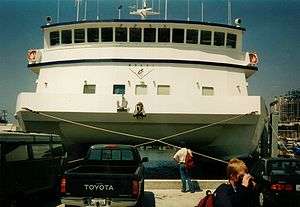RV Western Flyer
RV Western Flyer is a twin hulled SWATH research vessel operated by the Monterey Bay Aquarium Research Institute (MBARI). Its relatively stable SWATH design permits expanded operational capability in rough sea states. It is the platform of operations for the ROV Doc Ricketts[1] (named after Ed Ricketts). The vessel carries 10 crew, 5 ROV pilots, and 11 scientists, for a total complement of 26. Cruises generally center around the central California coast and Monterey Bay, although excursions further afield to Hawaii, the Pacific Northwest, and the Gulf of California have taken place in recent years.
 RV Western Flyer in Moss Landing | |
| History | |
|---|---|
| Operator: | Monterey Bay Aquarium Research Institute |
| Identification: |
|
| Status: | Active |
| General characteristics | |
| Type: | Research vessel |
| Tonnage: | |
| Displacement: | 419 LT |
| Length: | 117 ft 3 5⁄8 in (35.754 m) |
| Beam: | 53 ft (16 m) (moulded) |
| Draft: | 12 ft (3.7 m) |
| Installed power: |
|
| Propulsion: | 2 × 1,250 hp (930 kW) GE propulsion motors |
| Speed: | 14.5 knots (26.9 km/h; 16.7 mph) |
| Range: | 4,000 nmi (7,400 km; 4,600 mi) at 8 knots (15 km/h; 9.2 mph) |
| Crew: | 10 crew, 5 ROV pilots, 11 scientists |
| Fuel Capacity: | 22,000 US gal (83,000 l; 18,000 imp gal) |
| Potable Water: | 2,400 US gal (9,100 l; 2,000 imp gal) |
| Clean L.O. Capacity: | 700 US gal (2,600 l; 580 imp gal) |
| Dirty L.O. Capacity: | 700 US gal (2,600 l; 580 imp gal) |
| Ballast Capacity: | 19,530 US gal (73,900 l; 16,260 imp gal) |
| Gray Water: | 300 US gal (1,100 l; 250 imp gal) |
| Black Water: | 280 US gal (1,100 l; 230 imp gal) |
Vessel description/ design characteristics
General arrangement
Accommodations are provided for a combination of 26 crew members and scientists in 14 staterooms located on the upper deck. The crew complement is ten for all voyages and the combination of ROV staff and scientists (16) brings the total vessel complement to 26.
Equipment and control/monitoring systems
The main machinery plant is diesel electric with a common power bus connecting five generators. Any combination of generator operation will provide power for both propulsion and other vessel operations. This design arrangement provides a high level of machinery plant redundancy and operational flexibility. Propulsion power is transmitted through two duplicate drive trains, each consisting of a DC electric motor and fixed pitch propeller. Silicon controlled rectifiers (SCR's) are used to convert generated AC power to DC propulsive power. Two electric motor-driven bow thrusters are installed to enhance maneuvering and station-keeping.
Primary equipment and control/monitoring systems
- Four SCR drives: GE, Model DC2000
- Fuel centrifuge: Alfa Laval, Model MAB 103
- Marine sanitation device: Orca, Model 11A-36
- Air compressor: Quincy, Model QR 25
- One water-maker: Sea Recovery model SCR5M3-SW-H
- Cathodic protection/monitor: Swath Ocean Systems, Inc.
- Uninterruptible power supply: Exide Pwr Wave +18, J1842AU131EE00A
- Monitoring system: Exide Pwr Wave +18, J1842AU131EE00A
- Generator control: Point 8
- Propulsion control: Nautronix/GE/Omnithruster
- Bow thruster control: Omnithruster B2000
- Ballast system control: Swath Ocean Systems, Inc.
Primary navigation and communication equipment
- GPS: Leica MX420, Furuno SC120
- Radar: Furuno, Models FR2110 & FR1941
- Gyro compass: Sperry FOG Furuno SC120
- Dynamic positioning: Nautronix, Model ASK 4001
- Autopilot: Maritime Dynamics Inc, Nautronix ASK 4001.
- Motion Control: Maritime Dynamics Inc.
- Steering system: Swath Ocean Systems, Inc. / Maritime Dynamics
- GMDSS station: Furuno model RC5000 3T, areas A1-A3
- Depth sounder: Knudsen 3208/R (good to 5000m)
- PBX system: Knudsen 3208/R (good to 5000m)
- Weather station: Barometer, wind indicator, Furuno FW-200
- Computing station: Chart and Navigation
- Dopler: Furuno CI-80 current indicator
Primary fire fighting and safety equipment
- Fire detection and alarm system: Cerebus Pyrotronics MXL
- SOLAS Rescue Boat: Ribcraft 5.85m with 75 Honda outboard motor
- Life rafts: Two 25-Man Viking
- Extinguishing systems: Portable & fixed - (7) Fire Hose Stations
- EPIRB:
- Two 9Ghz SARTs
- One 406Mhz w/121.5 MHz beacon
Primary deck machinery
- Cranes:
- One - Model HIAB 290
- One - Modified Allied
- CTD winch system: Dynacon 12030
- Capacity: 6500 m of .322 in. cable
- Max. continuous line pull:
- Bare drum - 7000 lbs.@100 fpm
- Full drum - 4300 lbs.@140 fpm
- Max. continuous line speed:
- Bare drum - 240 fpm @ 2500 lbs.
- Full drum - 415 fpm @ 1450 lbs.
- Anchor windlass: Kolstrand Akphaw 223324
- Mooring winches: Four - Marco WG023
- ROV umbilical handling system: Dynacon TV3615K/SW3616K
- Stern "A-Frame": 13,000 lbs. SWL;
- 14 ft wide, 13 ft clearance through entire range of motion
References
- "Vessels and Vehicles - ROV Doc Ricketts". Monterey Bay Aquarium Research Institute. Retrieved 2013-09-15.
- "Vessels and Vehicles - R/V Western Flyer". Monterey Bay Aquarium Research Institute. Retrieved 2013-09-15.